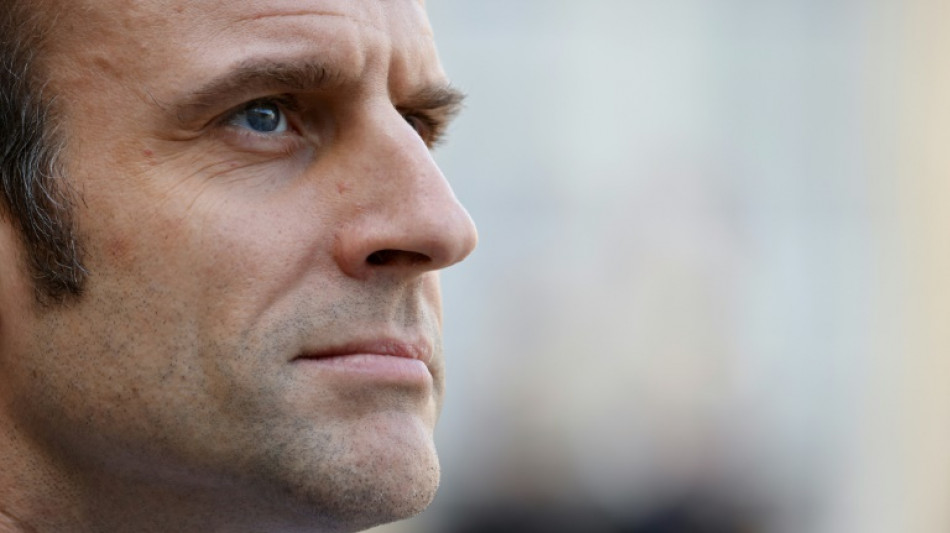
| SCS | -1.29% | 11.67 | $ | |
| NGG | 0.23% | 59.555 | $ | |
| JRI | 0.35% | 12.172 | $ | |
| BTI | 0.63% | 36.55 | $ | |
| CMSD | 1.15% | 23.4 | $ | |
| GSK | 0.4% | 33.955 | $ | |
| RYCEF | 2.34% | 7.25 | $ | |
| RBGPF | -5.05% | 59.02 | $ | |
| RIO | -0.11% | 58.745 | $ | |
| BCE | 0.41% | 23.275 | $ | |
| BCC | -1.41% | 117.205 | $ | |
| CMSC | 1.5% | 23.28 | $ | |
| BP | 1.27% | 29.94 | $ | |
| AZN | 0.55% | 65.88 | $ | |
| RELX | -0.08% | 45.385 | $ | |
| VOD | 0.24% | 8.51 | $ |

EU leaders dash Ukraine's swift accession hopes
EU leaders doused Ukraine's hopes Thursday of quickly gaining European Union membership, as they met to urgently address the fallout of Russia's invasion of its pro-Brussels neighbour.
The meeting at the palace of Versailles was set to be the high point of France's six-month EU presidency. But President Emmanuel Macron is instead leading a crisis summit following Russian leader Vladimir Putin's invasion which has upended decades of stability in Europe.
The Ukraine war and the EU's energy supply were to dominate the two-day meeting, with leaders sitting down for dinner in the same Hall of Mirrors where Western allies carved out a new map of Europe in 1919 after World War I.
"Europe changed with the pandemic and it will change even faster and stronger with the war," Macron said as he greeted his counterparts at the former residence of France's Sun King, Louis XIV.
The 27 heads of state and government met as fighting raged for a 15th day in Ukraine, with an outcry over the bombing of a maternity hospital in the besieged Ukrainian city of Mariupol.
Macron dubbed it a "disgraceful act of war", with leaders from across the bloc condemning the atrocity and pointing the finger at Moscow, which has denied responsibility.
The conflict has seen a swell of support in the EU for Ukrainian President Volodymyr Zelensky, but leaders used the talks to reiterate that a speedy path to membership was impossible.
"There is no such thing as a fast track," Dutch Prime Minister Mark Rutte said as he arrived for the talks.
"I want to focus on what can we do for Volodymyr Zelensky tonight, tomorrow, and EU accession of Ukraine is something for the long-term -- if at all," he added.
Luxembourg's Prime Minister Xavier Bettel warned against giving Kyiv the impression that "everything can happen overnight".
- 'Biggest issue' -
Even before the war, Macron's ambition for the summit was to lay down a path to strengthen Europe's stature on the world stage.
The issue took greater significance with Russia's war on the bloc's eastern edge, and leaders were to explore ways to shore-up Europe's self-reliance in an unstable world, especially on energy.
The conflict has seen energy prices skyrocket, threatened the economy and sparked a pressing discussion on where Europeans can turn for gas and oil. The problem became more acute with the wave of Western sanctions against Russia that also put pressure on energy markets.
"We must respond to support the purchasing power of families with the same speed with which we responded to the action of Russia," said Italian Prime Minister Mario Draghi.
The EU imports about 40 percent of its natural gas from Russia with Germany, Europe's biggest economy, especially dependent on the energy flow, along with Italy and several central European countries.
About a quarter of the EU's oil imports also come from Russia.
Europe's dependency on Russian energy even caused the first crack in the West's unified response to Putin's aggression, with the EU this week shying away from a ban on Russian oil imports implemented by the United States and Britain.
According to a draft of the meeting's final declaration, the 27 leaders will cautiously agree to "phase out" the bloc's dependency on Russian gas, oil and coal.
- 'Resolutely invest' -
The EU leaders will also try to advance on ways Europe can gain independence in highly sensitive sectors, including semiconductors, food production and, most notably, defence.
Collective security in the European Union is primarily handled by the US-led NATO alliance, but France, the EU's biggest military power, seeks an enhanced role for the bloc.
Since Russia's invasion of its pro-EU neighbour, bloc members have approved a total of half a billion euros in defence aid to Ukraine.
Berlin dramatically broke with long-standing doctrine when it announced it will plough 100 billion euros ($110 billion) into national defence.
In view of the challenges, "we must resolutely invest more and better in defence capabilities and innovative technologies", the leaders were expected to say.
P.Claes--JdB



